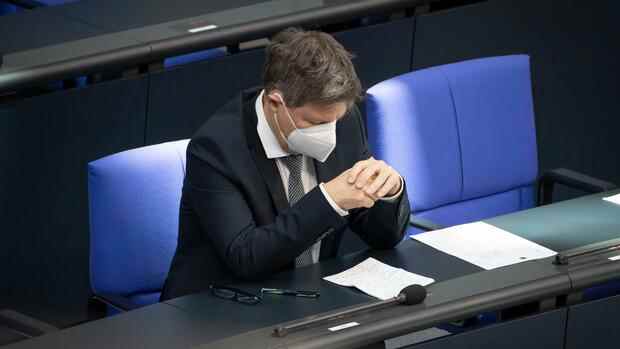Berlin The pressure on the federal government is growing. Western sanctions continue to do nothing to stop Russian President Vladimir Putin from bombing Ukraine.
But Berlin continues to resist an embargo on Russian energy supplies. Because that would lead to macroeconomic damage of “heaviest proportions”. At least that’s what Economics Minister and Vice Chancellor Robert Habeck (Greens) says.
“The most likely scenario is that a short-term delivery stop will cause an economic crisis in which gross domestic product (GDP) could collapse as much as in the Corona crisis in 2020,” they told Handelsblatt. There was also the threat of “dramatic social consequences”.
This was preceded by calculations by a group of six other top researchers. In the night from Monday to Tuesday, the scientists working with the Cluster of Excellence Econtribute and the Notre Dame economist Rüdiger Bachmann published a sensational study. Their conclusion: Germany can afford an energy embargo.
According to the top research team, German economic output would probably collapse by 0.5 percent in the event of an embargo in 2022, and even in the worst case it would be “only” three percent. On Tuesday morning, the National Academy of Sciences Leopoldina followed up with similar calculations.
“Massive consequences for other industries”
When asked about the studies, Minister of Economics Habeck rejected any criticism on Tuesday. The consequences of an energy embargo are assessed very differently.
Dullien and Krebs now explain what it’s all about – and put the calculations of their Econtribute colleagues through the wringer. According to a paper by the two, they underestimated “the economic and social effects of a short-term delivery stop because important channels of impact are neglected”.
Above all, it is about the consequences of an energy embargo that do not arise directly from a lack of oil, gas or coal. A delivery stop from Russia would drive up the already high prices considerably.
The Econtribute study hardly takes into account that all citizens would feel this in their wallets, that there could be turbulence on the financial markets and rapidly increasing inflation. The authors make this quite transparent. However, Dullien and Krebs consider this to be a “questionable interpretation”.
Bachmann and colleagues also underestimated the so-called “cascade effects”: the closely intertwined supply chains of the modern economy would mean that an energy embargo would not only affect companies that lack energy.
On the contrary, there would also be production stoppages at companies, which would then lack the materials – similar to the chip crisis in the automotive industry. The Econtribute study picks up some of the cascading effects, but not all of them. This could have “massive consequences for other sectors”, state Dullien and Krebs.
>> Read also: “The longer we wait, the more time Putin has” – economics for quick energy embargo
The explanations of the two economists were well received in Habeck’s house, can be heard from those close to the ministry – especially after the public scolding as a result of the publication of the Econtribute – and the Leopoldina calculations.
Economists cannot make the decision for politicians
However, the Econtribute authors are surprised that Dullien and Krebs come to such a different conclusion when it comes to the feasibility of an energy embargo.
Should Germany actually experience such a severe recession as in the first year of Corona, as Dullien and Krebs suspect, the GDP would fall by 4.6 percent per year. “At 4.6 percent, the order of magnitude that Dullien and Krebs see isn’t really different from our three percent,” says Econtribute co-author Moritz Schularick: “The conclusion should only be so completely different if we’re talking about 20 or 30 percent would talk.”
His colleague Bachmann from the US University of Notre Dame adds: “I have to admit: Certain effects are not included in our calculations. However, it is still unclear to me whether Dullien and Krebs are really far from our worst-case scenario.
Of course, an energy embargo would be a clear shock, as with Corona, and there could be cascading effects. “But we survived that, too,” says Bachmann.
Habeck, on the other hand, never tires of emphasizing that Germany must be able to “hold out” the sanctions against Russia for a longer period of time. An energy embargo lasting years with the corresponding ongoing losses in economic output is something different than just experiencing it this year – but that doesn’t mean that Germany can’t afford it under any circumstances.
Ultimately, an energy embargo is a question of consideration – and despite all the economic figures, only politics can decide on that.
More: Researchers consider the embargo on Russian energy manageable
